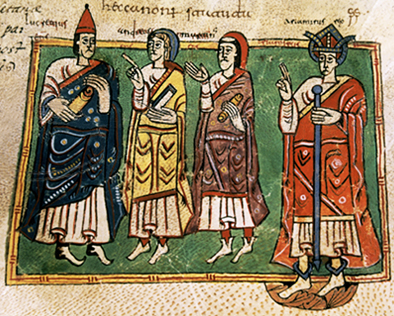Ariamir on:
[Wikipedia]
[Google]
[Amazon]
 Ariamir (died before 566) was the
Ariamir (died before 566) was the
"Braga and Tours: Some Observations on Gregory's ''De virtutibus sancti Martini''."
''
 Ariamir (died before 566) was the
Ariamir (died before 566) was the Suevi
file:1st century Germani.png, 300px, The approximate positions of some Germanic peoples reported by Graeco-Roman authors in the 1st century. Suebian peoples in red, and other Irminones in purple.
The Suebi (also spelled Suavi, Suevi or Suebians ...
c King of Galicia
Galicia (Spain), Galicia is an autonomous community and historical nationality in modern-day northwestern Spain on the Iberian Peninsula, which was a major part of the Roman province known as Gallaecia prior to 409. It consists of the province ...
, with his capital at Bracara, from 558/9. The bishops of the First Council of Braga recorded Ariamir as the king who summoned them and under whose auspices they deliberated. Because the bishops mention theirs as being the first Nicene
The Nicene Creed, also called the Creed of Constantinople, is the defining statement of belief of Nicene Christianity and in those Christian denominations that adhere to it.
The original Nicene Creed was first adopted at the First Council of N ...
synod to be held in Galicia in a long while, Ariamir is sometimes assumed to have been the king who led the conversion of his people from Arianism
Arianism (, ) is a Christology, Christological doctrine which rejects the traditional notion of the Trinity and considers Jesus to be a creation of God, and therefore distinct from God. It is named after its major proponent, Arius (). It is co ...
to orthodoxy and thus to have lifted the ban on Nicene councils.
The conversion of the Suevi to Catholicism, however, is presented very differently in the primary records, of which the minutes of the council of Braga are the only contemporary ones. Specifically, the minutes of the council—which met on 1 May 561 (in the era of the province 599, the third year of his reign, ''anno tertio Ariamiri regis'')—state explicitly that the synod was held at his orders, ''ex praecepto praefati gloriosissimi Ariamiri regis'', and the bishops allude to him as "our most glorious and pious son" (''gloriosissimus atque piissimus filius noster''). Based on the dating clause, Ariamir's reign can be said to have begun between 2 May 558 and 1 May 559. While his Catholicism is not in doubt, that he was the first Catholic monarch of the Sueves since Rechiar has been contested.Thompson, 86.
It has also been suggested that Ariamir was the same person as Theodemir
Theodemir, Theodemar, Theudemer or Theudimer was a Germanic name common among the various Germanic peoples of early medieval Europe. According to Smaragdus of Saint-Mihiel (9th century), the form ''Theudemar'' is Frankish and ''Theudemir'' is ...
, who is mentioned by Isidore of Seville
Isidore of Seville (; 4 April 636) was a Spania, Hispano-Roman scholar, theologian and Roman Catholic Archdiocese of Seville, archbishop of Seville. He is widely regarded, in the words of the 19th-century historian Charles Forbes René de Montal ...
in connection with the Suevic conversion and Martin of Dumio. He is likewise also said to have been a son of Chararic, a king mentioned by Gregory of Tours
Gregory of Tours (born ; 30 November – 17 November 594 AD) was a Gallo-Roman historian and Bishop of Tours during the Merovingian period and is known as the "father of French history". He was a prelate in the Merovingian kingdom, encom ...
in connection with the conversion and Martin of Tours
Martin of Tours (; 316/3368 November 397) was the third bishop of Tours. He is the patron saint of many communities and organizations across Europe, including France's Third French Republic, Third Republic. A native of Pannonia (present-day Hung ...
. It is likely, however, that Chararic and Theodemir must have reigned after Ariamir, since Ariamir must have been the first Suevic monarch to lift the ban on Catholic synods and it is inconceivable that a Catholic monarch could have continued the ban for "a long time". On the other hand, some scholars see the conversion of the Suevi as progressive and stepwise and regard Ariamir's lifting of the ban on synods as the second step following Chararic's public conversion.Ferreiro, ''passim''.
Aside from the council held in his name, nothing else is known of Ariamir except that he was probably succeeded sometime between the end of May 561 and the year 566 by Theodemir.
Sources
*Ferreiro, Alberto"Braga and Tours: Some Observations on Gregory's ''De virtutibus sancti Martini''."
''
Journal of Early Christian Studies
The ''Journal of Early Christian Studies'' is an academic journal founded in 1993 and is the official publication of the North American Patristics Society. It is devoted to the study of patristics, that is Christianity in the ancient period of ro ...
''. 3 (1995), p. 195–210.
*Thompson, E. A. "The Conversion of the Spanish Suevi to Catholicism." ''Visigothic Spain: New Approaches''. ed. Edward James
Edward Frank Willis James (16 August 1907 – 2 December 1984) was a British poet known for his patronage of the surrealist art movement.
Early life and marriage
James was born on 16 August 1907, the only son of William James (who had inheri ...
. Oxford: Oxford University Press, 1980. .
Notes
{{DEFAULTSORT:Ariamir 6th-century Suebian kings 560s deaths Christian monarchs History of Braga Year of birth unknown 6th-century Christians